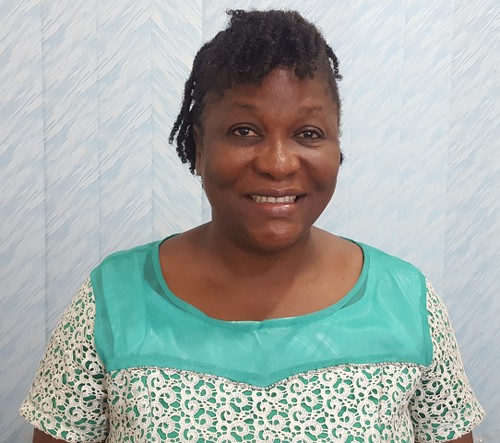Ajayi Folasade is subnational coordinator for the African Chicken Genetic Gains (ACGG) Project in Zone 2 of Rivers State in Nigeria. She introduces herself and her work in this post, which is one of a series of portraits of key people in the project.
Tell us about your background
I had my initial academic training in general agriculture; thereafter I got my PhD in animal breeding and genetics with specific interest in phenotypic and genetic characterization of Nigerian indigenous livestock species. My research focus on indigenous chicken in the Niger Delta region showed that Nigerian indigenous chicken possessed copious genetic and performance information that could be used in breed improvements. These findings may provide more insights to the African Chicken Genetic Gains (ACGG) project in Rivers State.
What is your role in ACGG and what are you currently working to accomplish?
As subnational coordinator for Zone 2 in Rivers State my role is to supervise and monitor field officers in data collection, facilitate community innovation platforms and encourage farmers in adopting good management practices for maximum productivity of their birds.
What is your current and upcoming work in ACGG?
As the project progresses, the focus is on getting adequate and correct information (data) from the participating farmers and also comparing the performance of the improved breeds under different production environments.
What are some interesting research findings from ACGG in your region?
Some interesting research findings so far in my region are the following:
- The cocks of the introduced birds, especially Sasso and Kuroiler, are heavier and meatier than the males of our local birds.
- The awareness for participation in the project has increased greatly as more households attend the community innovation platform meetings and many farmers are interested in getting the day-old chicks of the introduced birds.
What are some of the most intriguing or innovative research question that you are currently exploring and/or want to explore in ACGG?
Some of the most innovative research questions include;
- How will the farmers get regular supply of their preferred breeds of chicken?
- How will farmers overcome the problem of getting supplementary feed especially using the available local feed resources?
- How will the community innovation platforms be transformed into self-sustaining initiatives for all actors in the chicken value chain beyond the project?
What are you seeing as being unique to your region?
One unique thing I have seen is the fact that the farmers did not want to lose the good traits of more meat and eggs in the introduced breeds, so some of them have crossed the breeds with their local chickens to improve the latter’s performance.
Why does this work matter and what gets you excited about this project?
The main aim of the project is to improve the livelihoods of smallholder poultry farmers especially women and youth. I am excited seeing that women are being liberated out of poverty and food insecurity through more eggs and meat derived from the ACGG birds given to them.
What about the project causes concern for you and how could this be addressed?
The two major concerns are, first, disease problems encountered by farmers on almost all the breeds at the beginning of the project due to very high rainfall in the Niger Delta leading to loss of birds to cold and flood. Secondly, the issue of getting supplementary feeds at affordable prices for the birds since they are reared mainly under the semi scavenging production system. The disease problems has been addressed through the training of animal health workers by the ACGG Nigeria team and commercial feed producers are being encouraged to produce feeds in small packs of 5-10 kg each in order to make it affordable for farmers.
What do you foresee as the lasting impact of ACGG?
I think the lasting impact of ACGG will be that smallholder chicken producers in Nigeria will gradually transform their poultry production into business enterprises thereby reducing poverty. I also foresee greater demands for day-old chicks of the improved birds introduced by the project from both participating and non-participating farmers.
Any other thought you would like to share?
Active participation of women in the ACGG project has given them voice in the community. But there is still need to strengthen networks and collaboration between participating groups for continuous information sharing and insights into the project.

Thank you for coordinating the activities in Rivers State
LikeLike
How can one participate in this project in Rivers State?
LikeLike
Good morning sir, my name is Ayo contacting you from ilorin. Sir, i came across the great work ACGG is doing in the field of improved chicken breed. Sir, am very interested in the keeping poultry but alway scare of there high mortality rate. I came across ACGG in the cause of my search for improved breeds (layers). Sir, please link me up on where to purchase this new breeds. I leave in ilorin, running my masters degree lautech. If there is anywhere i can get it between oyo and kwara state. It will be more aporeciated sir.
Hope to get a reply soon.
Thank you sir
Ayo.
LikeLike
You can send a mail to africacgg.nigeria@gmail.com with your specific request. The Funaab Alpha, ShikaBrown and Noiler breeds can be sourced locally, but Sasso and Kuroiler are not yet available in commercial quantities.
LikeLike
Please send a mail to africacgg.nigeria@gmail.com with your specific requests. The Funaab Alpha, ShikaBrown and Noiler chicken breeds can be sourced locally, but Sasso and Kuroiler are not yet available in the country in commercial quantitie
LikeLike
Please send a mail to africacgg.nigeria@gmail.com with your specific requests. The Funaab Alpha, ShikaBrown and Noiler chicken breeds can be sourced locally, but Sasso and Kuroiler are not yet available in the country in commercial quantities.
LikeLike